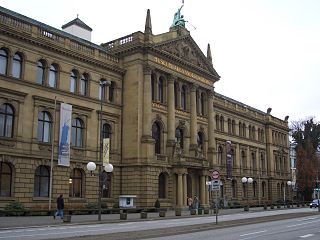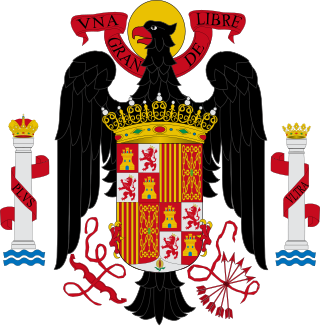
A constituent assembly is a body assembled for the purpose of drafting or revising a constitution. Members of a constituent assembly may be elected by popular vote, drawn by sortition, appointed, or some combination of these methods. Assemblies are typically considered distinct from a regular legislature, although members of the legislature may compose a significant number or all of its members. As the fundamental document constituting a state, a constitution cannot normally be modified or amended by the state's normal legislative procedures in some jurisdictions; instead a constitutional convention or a constituent assembly, the rules for which are normally laid down in the constitution, must be set up. A constituent assembly is usually set up for its specific purpose, which it carries out in a relatively short time, after which the assembly is dissolved. A constituent assembly is a form of representative democracy.

The Spanish Constitution is the supreme law of the Kingdom of Spain. It was enacted after its approval in a constitutional referendum; it represents the culmination of the Spanish transition to democracy. It is a written constitution.

The Constitution of Pakistan, also known as the 1973 Constitution, is the supreme law of Pakistan. The document guides Pakistan's law, political culture, and system. It sets out the state's outline, the fundamental rights of the population, the state's law and orders, and also the structure and establishment of the institutions and the armed forces. Drafted by the government of Zulfikar Ali Bhutto, with additional assistance from the country's opposition parties, it was unanimously approved by the 5th Parliament on 10 April and ratified on 14 August 1973. The first three chapters establish the rules, mandate, and separate powers of the three branches of the government: a bicameral legislature; an executive branch governed by the Prime Minister as chief executive; and an apex federal judiciary headed by Supreme Court. The Constitution designates the President of Pakistan as a ceremonial Head of State who is to represent the unity of the state. The first six articles of the constitution outline the political system as federal parliamentary republic system; as well as Islam as its state religion. The Constitution also encapsulates provisions stipulating the legal system's compliance with Islamic injunctions contained in the Quran and Sunnah.

The Constitution of India is the supreme law of India. The document lays down the framework that demarcates fundamental political code, structure, procedures, powers, and duties of government institutions and sets out fundamental rights, directive principles, and the duties of citizens, based on the proposal suggested by M. N. Roy. It is the longest written national constitution in the world.

The Spanish Republic, historiographically referred to as the First Spanish Republic, was the political regime that existed in Spain from 11 February 1873 to 29 December 1874.

The Constitution of the Bolivarian Republic of Venezuela is the current and twenty-sixth constitution of Venezuela. It was drafted in mid-1999 by a constituent assembly that had been created by popular referendum. Adopted in December 1999, it replaced the 1961 Constitution, the longest-serving in Venezuelan history. It was primarily promoted by then President of Venezuela Hugo Chávez and thereafter received strong backing from diverse sectors, including figures involved in promulgating the 1961 constitution such as Luis Miquilena and Carlos Andrés Pérez. Chávez and his followers (chavistas) refer to the 1999 document as the "Constitución Bolivariana" because they assert that it is ideologically descended from the thinking and political philosophy of Simón Bolívar and Bolivarianism. Since the creation of the Constituent National Assembly in August 2017, the Bolivarian government has declared the 1999 constitution suspended until a new constitution is created.

The Parlamentarischer Rat was the West German constituent assembly in Bonn that drafted and adopted the constitution of West Germany, the Basic Law for the Federal Republic of Germany, promulgated on 23 May 1949.

The present Constitution of Portugal was adopted in 1976 after the Carnation Revolution. It was preceded by a number of constitutions including the first one created in 1822, 1826, 1838, 1911, and 1933.

The Constituent Assembly of India was elected to frame the Constitution of India. It was elected by the 'Provincial Assembly'. Following India's independence from the British rule in 1947, its members served as the nation's first Parliament as the 'Provisional Parliament of India'.

The Spanish transition to democracy, known in Spain as la Transición or la Transición española, is a period of modern Spanish history encompassing the regime change that moved from the Francoist dictatorship to the consolidation of a parliamentary system, in the form of constitutional monarchy under Juan Carlos I.

The Federal Parliament of Nepal is the bicameral federal and supreme legislature of Nepal established in 2018. It consists of the National Assembly and the House of Representatives as parallel houses.

A constitutional referendum was held in Spain on Wednesday, 6 December 1978, to gauge support for either the ratification or repealing of the Spanish Constitution which had been approved by the Cortes Generales on 31 October 1978. The question asked was "Do you approve of the Constitution Bill?". The referendum resulted in 91.8% of valid votes in support of the bill on a turnout of 67.1%.

The Anglo-Corsican Kingdom, also known officially as the Kingdom of Corsica, was a client state of the Kingdom of Great Britain that existed on the island of Corsica between 1794 and 1796, during the French Revolutionary Wars.
A referendum on political reform was held in Spain on Wednesday, 15 December 1976, to gauge support for either the ratification or repealing of the Political Reform Act which had been approved by the Cortes Españolas on 18 November 1976. The question asked was "Do you approve of the Political Reform Bill?". The referendum resulted in 97.4% of valid votes in support of the bill on a turnout of 77.7%.
A world constitution refers to a proposed framework or document aimed at establishing a system of global governance. It seeks to provide a set of principles, structures, and laws to govern the relationships between states and address global issues. The concept of a world constitution reflects the aspiration for greater international cooperation, peace, and the resolution of global challenges.
Amending the Constitution of India is the process of making changes to the nation's fundamental law or supreme law. The procedure of amendment in the constitution is laid down in Part XX of the Constitution of India. This procedure ensures the sanctity of the Constitution of India and keeps a check on arbitrary power of the Parliament of India.

The Constitution of Costa Rica is the supreme law of Costa Rica. At the end of the 1948 Costa Rican Civil War, José Figueres Ferrer oversaw the Costa Rican Constitutional Assembly, which drafted the document. It was approved on 1949 November 7. Several older constitutions had been in effect starting from 1812, with the most recent former constitution ratified in 1871. The Costa Rican Constitution is remarkable in that in its Article 12 abolished the Costa Rican military, making it the second nation after Japan to do so by law. Another unusual clause is an amendment asserting the right to live in a healthy natural environment.

The Political Reform Act was the Spanish law that re-established democracy and allowed the elimination of the governmental structures of the Franco dictatorship through a legal process. It is one of the key events in the Spanish Transition.

Parliamentary elections were held in Portugal between 10 and 27 December 1820. They followed the Liberal Revolution on 24 August. These were the first parliamentary elections in Portugal. This election aimed to form assemblies in three levels: parochial, provincial, and the Constituent Cortes of 1820.

An election for the members of the Constitutional Convention was held in Chile between 15 and 16 May 2021. This election was called after 78% of voters in the 2020 national plebiscite voted to write a new Constitution through this method.















